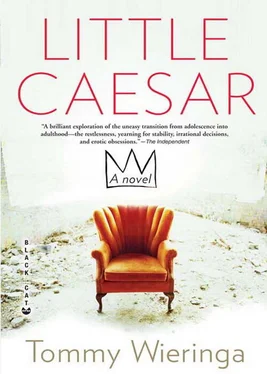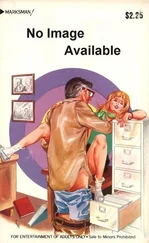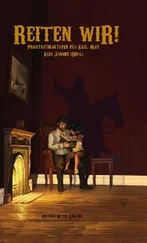Canned laughter, please. Uncle Gerard’s chuckle is really a bit too paltry.
Of all the requiems I’ve come up with for you in my life, this final one is truly the most wretched. It’s so prosaic, real death doesn’t sound at all like a requiem, it doesn’t echo at all. A requiem is thinking about death, not death itself. Sometimes I used to tell you the texts of my funeral orations, a game, a charm against misfortune. As long as I could tell you about it, everything was as it should be. One time I accidentally predicted what would actually happen much, much later. I told you what I would say if you would die after a long illness. I used the word strong . You bridled. Strong? You could say that about anybody who’s been sick a long time. A little more special, if you please. I replaced it with fearless. Much better , you said. Do that one . This is your day, Mom, here is your word, you fearless one. You chose it yourself.
But that I, in my youthful impetuosity, called you an angel , I take that back. You were not that. Or at least no more than half. The other half truly consisted of more warm-blooded material.
Well then, it’s now up to me to determine how you will be remembered, the counterfeiting has begun. You no longer harass me with who you are. I can love you better that way. Peace, Mother, peace. The loveliest lie wins, as it always has. Too much truth isn’t good for a body. The same thing goes for loss. And now that I have no-one left to lose, I prefer to have you around in my memories as good company. If you have trouble going along with that, then please try a little harder. Try to humor me a little for a change.
I am now someone without you. That knowledge. .
Better to play something for you. I’ve chosen Beethoven’s Marcia Funebre Sulla Morte d’un Eroe , especially for you. I’ll play it for you as though I were in the Royal Festival Hall. And if you sort of close your eyes and peek through your lashes, then that’s where we’ll be. I’m waving to you. You’re moving further away, you’re all the way at the back of that dark concert hall now, I can barely see you. Goodbye, Mama. Goodbye.
After laying a hand on the coffin and mumbling things, we left the auditorium — the dispatch would take place in our absence. We stood together in the reception room, a bit bedraggled. The unknown man came up to offer his condolences, his eyes averted,
‘Thank you,’ I said. ‘Nice of you to come.’
And then, to his back, while he was already walking away, I asked, ‘Excuse me, sir, but could I ask your name?’
He turned around, took a few steps towards us.
‘Boender,’ he said.
The Rolodex, and fast! Boender?! Boender!
‘The musician!’ I said. ‘You went with my mother to Los Angeles. .’
He nodded.
‘A long time ago, yeah.’
The local dialect. Aunt Edith and Uncle Gerard stood there, staring blankly at this encounter that moved me for reasons I didn’t quite understand.
‘Guitar player, right? Route 66?’
‘Yup,’ he said.
A farmer’s hands, ashamed of themselves. Dark, callused lines on the fingers.
‘Do you still play?’
‘Oh, a little rockin’ in the city. Bars and cafés. Nothing special.’
I wanted to talk to him about her, about how she had been, that mother of mine, before I was there, when she was still young, not quite a girl anymore, but I could feel the situation slipping away from me. He took a step back, with his eyes fixed on the carpet, and said, ‘Well, take care then.’
And disappeared. The ghost who had accompanied her to the City of Angels, tossed aside once the light focused on her. I suddenly realized why he touched me: the convoluted thought that he could have been my father.
Why the hell isn’t there a flight to El Real? The man from Aeroperlas raises his hands in surrender: next week, if I understand correctly. It’s nothing but a ribbon of asphalt in the jungle, that airfield at El Real, where I have to go to find him. Aeroperlas runs a sporadic service there with little prop planes. I feel like kicking something to bits. I walk away, then back to the ticket counter. Is there any other way to get there? He consults with a colleague. I would have to travel to Yaviza, I hear. From there downriver to El Real.
I go back to my hotel in Panama City. The thought of staying here for a week is a burden. I have no sightseeing plans, and I can’t motivate myself to come up with any, either. What had quietly waited in the wings all those years has suddenly become urgent.
Very early the next morning, I deposit my bags in the trunk of the taxi. The new bus terminal: from there, they’ve assured me, buses leave for Darién, the eastern province that borders on Colombia. There’s no road between the two countries, the Pan-American Highway is chopped in two by rivers, mountains and virgin rainforest. With all the horrors that go along with that. In any case, I can almost certainly catch a bus as far as Metetí.
Darkness still. A sliver of moon, light clouds. I’m much too early, no buses leave before nine. I eat breakfast at the terminal. Mr. Chen fries banana-and-honey pancakes for me, he says, ‘El Real is just like Macondo. Why do you want to go there? Nothing but wilderness. I was born there, but I haven’t been back in twenty years. Not my kind of place.’
A black woman slides up to the counter, moaning and sputtering. Shopping bags everywhere, her broad lap is covered with them.
‘You’re going to Darién? Oh my God! Are you sure? The Indians there eat people! I’ll keep you in my prayers. But right now I could use a soda.’
The bus stops at a filling station, men are rocking their cars back and forth to get more gas into the tanks. As the day wears on, the thinking stops. You become a sack of flour, a bale of cloth, you wait for them to come and unload you. Trees are dropping big, brown leaves.
The Policía Nacional at Caňazas, all two of them, make me get off the bus. In their little office they jot down the information from my passport. Flipping the pages, turning it sideways, peering at stamps. I know just enough Spanish to get by.’
‘What is your destination?’
‘Yaviza.’
‘That’s off limits. You cannot go to Yaviza without permission from the ministry.’
‘So I’m going to Metetí.’
‘Okay, that’s fine.’
Trucks laden with red logs for the civilized world behind us. Huge trunks stripped of their bark. A routed army, humiliated and sent on transport — a cloud of dust in its wake.
At Agua Fria the asphalt stopped. People climbed off the bus. People vanished. The driver pointed at a waiting Toyota Hilux pickup with men sitting in the back. The truck pulled away. I ran after it, shouting, ‘Yaviza? Yaviza?’
‘ Yaviza, si! ’ the men shouted back.
They grabbed my suitcase and pulled me up onto the bed. Nodding, laughing: that was a close one, gringo. In the cab, the driver ties a bandana around his face to keep out the dust. We hold on tight, the truck jolts, slams into potholes and rolls up out of them again. Children with slingshots are walking along the road. Their fathers are carrying rifles. Indians with machetes, their hair stiff with dust. The end of another day. I wrap a T-shirt around my head. The men toss me an occasional, worried look, a stranger in their country. Nothing they are wearing or carrying is new. Around here, adapting means fading, becoming drab, wearing thin. It goes automatically, the heat and the humidity eat away at everything. It happens before you know it.
The village at the end of the road. Yaviza. The last stretch driven by starlight. The moon wasn’t showing its face yet. Only one hotel, and I keep my suitcase closed to shut out the vermin. From now on, I vow, I will shake out my shoes every morning. (National Geographic Channel wisdom.)
Читать дальше












